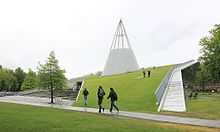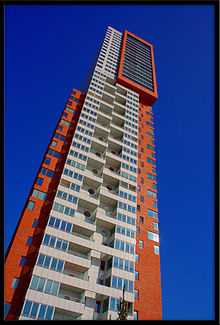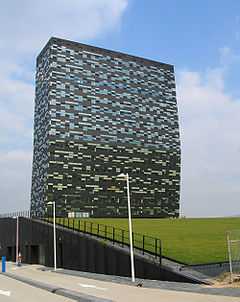Mecanoo
Mecanoo is an architecture firm based in Delft, The Netherlands. It was founded in 1984 by Francine Houben, Henk Döll, Roelf Steenhuis, Erick van Egeraat and Chris de Weijer. The firm is directed by its original founding architect and creative director Francine M. J. Houben alongside partners Aart Fransen, Francesco Veenstra, Ellen van der Wal, Paul Ketelaars and Dick van Gameren. The firm's designs include technical, human and playful aspects. Mecanoo combines the disciplines of architecture, urban planning and landscape architecture in a sometimes unorthodox way and with sensitivity for light. Each project is approached in terms of context and how it relates to the larger urban and social fabric; how it impacts the environment and the beauty of place.
Firm name
The firm's name Mecanoo is inspired by the Erector Set ‘Meccano’, a set of metal pieces, nuts, bolts, etc. and tools specially designed for constructing small models of buildings, machines, or other engineering apparatus. It symbolizes the joy to build. The diver logo represents freedom of thinking and optimism.
The name Mecanoo is a combination of three different words, the British model construction kit Meccano, the neoplasticist pamphlet mecano drawn up by Theo van Doesburg in 1922 and the motto 'Ozoo', adopted in 1984 by the original founding members of Mecanoo for their competition entry for a housing complex in the area of Rotterdam's former zoo. The competition was entered while they were still students at TU Delft.[1]
Office location
Mecanoo is located on one of the oldest canals of the Netherlands, the Oude Delft, in the historical city centre of Delft. This canal house dating from 1750 was designed by the Italian architect Bollina. The interior has a 40-metre long corridor with a stairwell, ceilings and doors with stucco work and carvings in Louis XIV style. After Oude Delft 203 had been occupied in the nineteenth century by several leading citizens, it was sold in 1886 to the Roman Catholic charity for the poor, later the St. Hippolytus Foundation. Until 1970 it served as lodging for the elderly and later as a hospital. In 1983 Mecanoo rented a part of the canal house and now occupies the entire building.
Oeuvre
Since 1984 Mecanoo has been working progressively on an extensive and varied oeuvre. In the early years the work consisted mainly of social housing projects in urban renewal areas. Currently the work focuses on complex, multifunctional buildings and integral urban developments, combining urban planning, landscaping, architecture and interior design. Project types include houses, schools and complete neighbourhoods, theatres, libraries and sky scrapers, parks, squares and highways, cities and polders, hotels, museums and places of worship.
Design philosophy
From the start of the 1990s Mecanoo developed an increasingly clear signature. The three words in the title of Francine Houben’s book: composition, contrast and complexity, sum up the basis of Mecanoo’s architecture but say little about its nature, which in all respects is the complete opposite of cool, abstract and minimalist. Maximalist might be an appropriate neologism for this architecture that is warm and tangible and always offers a rich sensory experience.
Practice
Mecanoo has grown into a prominent Dutch architecture practice with an international, multi-disciplinary staff composed of architects, interior designers, urban planners, landscape architects and architectural engineers with projects in The Netherlands, Spain, the United Kingdom, China, Taiwan, Korea, Turkey, the United States and Russia.
Selected works


- Faculty of Economics and Management, Utrecht (1991–1995)
- Delft University of Technology Library, Delft (1993–1997)
- Netherlands Open Air Museum, Arnhem, (1995–2000)
- Masterplan Delft University of Technology (2001–2002)
- Montevideo, Rotterdam (1999–2005)
- Da Vinci College, Learning Park, Dordrecht (2004–2007)
- FiftyTwoDegrees, Nijmegen (2001–2007)
- La Llotja Theatre and Congress Centre, Lleida, Spain (2005–2008)
- Amphion Theatre, Doetinchem, NL (2006–2009)
- Kaap Skil, Maritime and Beachcombers Museum, Texel, the Netherlands (2006-2012)
- Amsterdam University College, Amsterdam (2008-2012)
- Library of Birmingham integrated with Birmingham Repertory Theatre, Birmingham, United Kingdom. (2008-2013)
- HOME, Manchester, United Kingdom (2011-2015)
- Bruce C. Bolling Municipal Center, Boston, United States (2011-2015)
- Palace of Justice, Córdoba, Spain (2006–2016)
- National Kaohsiung Center for the Arts, Kaohsiung, Taiwan (2007–2016)
- Municipal offices and train station, Delft (2006–2016)
Selected awards and honours
- 1987 City of Rotterdam Rotterdam Maaskant Prize for Young Architects
- 1996 Ministry of Education, Culture and Science Best School Building Prize 1996 for Isala College, Silvolde, the Netherlands
- 1998 National Steel Construction Prize 1998 for the Library Delft University of Technology
- 2001 City of Rotterdam Building Quality Award 2000 for residential area Nieuw Terbregge, Rotterdam, the Netherlands
- 2001 ‘TECU’ Architecture Award 2000 for the National Open Air Museum
- 2001 A.M. Schreuders Prize 2001 for best underground building for Office Villa Maliebaan, Utrecht, , the Netherlands
- 2003 Dutch Building Prize 2003 for the National Open Air Museum
- 2006 City of Rotterdam Building Quality Prize 2006 for Montevideo
- 2006 National Steel Construction Prize 2006 for Montevideo
- 2006 International Prize Dedalo Minosse 2005/2006 for Montevideo
- 2006 International Highrise Award 2006 for Montevideo
- 2007 Brick Award for Swimming Pool and Sports Centre Het Marnix in Amsterdam, , the Netherlands
- 2008 International Prize Dedalo Minosse 2007/2008 Special Prize for Sustainability for FiftyTwoDegrees
- 2010 Green GOOD Design Award for Municipal Offices and Train Station Delft
- 2013 Amsterdam Architecture Prize 2013 (Golden A.A.P.) for Amsterdam University College
- 2013 Architects’ Journal Building of the Year 2013 for Library of Birmingham
- 2014 RIBA West Midlands Building of the Year 2014 for Library of Birmingham
- 2014 RIBA National Award 2014 for Library of Birmingham
- 2014 Stirling Prize nomination 2014 for Library of Birmingham
Selected publications
- Houben, F., Vollaard, P., Waaijers, L., Mecanoo architecten, Bibliotheek Technische Universiteit Delft, Rotterdam 1998
- Houben, F., ‘Ingenieurskunst en mobiliteitsesthetiek’, in: Architectuur en de openbare ruimte, de dynamische delta 2, Ministry for Transport, Public Works and Water Management/ Mecanoo architecten, The Hague 1999
- Houben, F., Maliebaan, een huis om in te werken, Andersson Elffers Felix, Utrecht/ Mecanoo architecten, Delft 2000
- Houben, F., Composition, Contrast, Complexity, NAi Publishers, Rotterdam 2001 / Birkhaüser, Basel, Boston, Berlin 2001
- Mecanoo architecten, TU Delft Vastgoed, ING Vastgoed, TU Delft Masterplan, DUP Satellite, Delft 2002
- Houben, F., L. M. Calabrese (ed.), Mobility, A Room with a View, Rotterdam 2003
- Mecanoo architecten, Holland Avenue, Research Road Atlas; Holland Avenue, Design Road Atlas, Ministry for Transport, Public Works and Water Management, The Hague 2003
- Houben F., Mgr. A.H. van Luyn S.D.B., Jan van Adrichem, Max van Rooy, En het eeuwige licht verlichte haar, Kapel Heilige Maria der Engelen, Rotterdam 2004
- Brouwers, R., Betsky, A, Mecanoo, Masters of Architecture Series, Images Publishing Group, Mulgrave, Victoria, Australia (published May 2008)
Selected exhibitions
- 2014 A People’s Palace, Aedes Architecture Forum, Berlin
- 2008 Pavilion A Piece of Banyan, Interni/Green Energy Design, Milano Capitale del Design 2008, Italy (opening 16 April 2008)
- 2008 Mecanoo: Dutch Mountains, 101 Building Taipei, Taiwan
- 2007 Dutch Design Exhibition, Old Millfun 1933 Building, Shanghai, China
- 2007 3rd International Architecture Biennale Rotterdam, Kunsthal, Rotterdam
- 2007 Dutch Mountains, Casa CASLa, Almere
- 2006 British Pavilion, 10th International Architecture Biennale, Venice, Italy
- 2003 First International Architecture Biennale Rotterdam, Netherlands Architecture Institute, Rotterdam
- 2003 Grattacieli all’Orizzonte/Skyscrapers on the Skyline, Galleria Vittorio Emanuele, Urban Center of the Municipality of Milan, Italy
- 2002 Works in progress, GA Gallery, Tokyo, Japan
- 2002 Next, 8th International Exhibition of Architecture, Venice, Italy
- 2001 Mecanoo architects, Composition, Contrast, Complexity, Netherlands Architecture Institute, Rotterdam
- 1999–2000 Mecanoo Blue, 4a Bienal Internacional de Arquitectura, São Paulo, Brazil;
- Museo Nacional de Belles Artes, Buenos Aires, Argentina
- 2000 Mecanoo, the reflective architect, travelling exhibition through the U.S.A.
- 1999 Mecanoo, Opere e progretti, Pinacoteca Civica, Como, Italy
References
- ↑ Mecanoo: Experimental Pragmatism by Pietro Valle
External links
| Wikimedia Commons has media related to Buildings by Mecanoo. |
